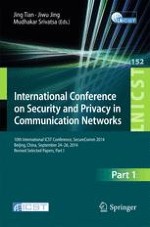2015 | OriginalPaper | Chapter
SCADS
Separated Control- and Data-Stacks
Authors : Christopher Kugler, Tilo Müller
Published in: International Conference on Security and Privacy in Communication Networks
Publisher: Springer International Publishing
Activate our intelligent search to find suitable subject content or patents.
Select sections of text to find matching patents with Artificial Intelligence. powered by
Select sections of text to find additional relevant content using AI-assisted search. powered by
